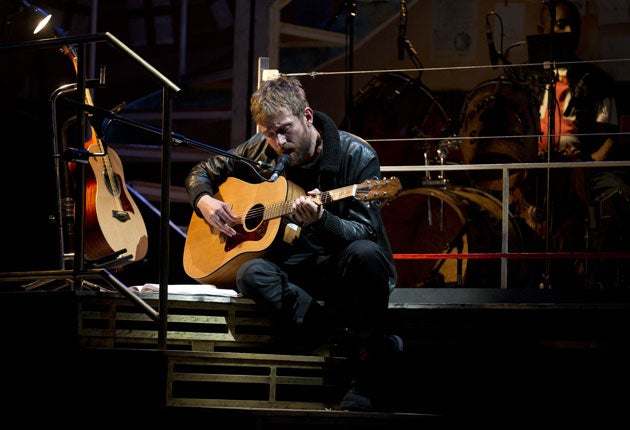Dr Dee, Palace Theatre, Manchester<br/>The Crash of the Elysium, MediaCity UK, Salford<br/>Biophilia, Campfield Market Hall, Manchester
Damon Albarn's opera makes an ambitious attempt to resurrect the spirit of a once important Elizabethan courtier

Manchester International Festival premieres new work on a grand scale, with ambitious collaborations that strain at whatever genre box you put them in.
So it is with Dr Dee. Subtitled "An English Opera", it's the co-creation of Damon Albarn, Blur and Gorillaz frontman, and theatre director Rufus Norris.
Dr John Dee was a Renaissance man with as many talents as Albarn has musical projects: mathematician, astronomer, geographer, alchemist. While he became a crucial part of Elizabeth I's court, his involvement with a mad medium, Edward Kelley, saw him discredited as a conjuror of evil spirits.
Albarn has suggested Dr Dee is more a masque than an opera, which makes sense: it can be understood as a series of tableaux, symbolic parades, and striking moments. Norris knows how to create strong shapes on stage, such as the stiff, mid-air suspension of Elizabeth I with great swathes of gold cloth streaming from her. He makes inventive use of concertinaed sheets of paper, which become ever larger screens, to be projected upon or used to wipe, cinematically, between different times, locations, actions. There are falling feathers, streams of dust, storms of pages – as Dee's learning comes to naught when he's duped by Kelley.
Yet the show fails to conjure John Dee, the man. The storytelling seems muddled, all these images not quite joining up. Dee's downfall doesn't feel tragic as his brilliance was never fully illuminated in the first place, and given the only moving scene is one in which Dee (Bertie Carvel) lets the grotesque Kelley (Christopher Robson) essentially rape his wife, it's hard to match Albarn's enthusiasm for the character. Albarn ends with the appeal "England sing for John", but I'm not sure I want to.
The pick'n'mix approach is more successful in the music; the combination of the BBC Philharmonic and a merry band of musicians playing early instruments (pipes, lutes, viols) as well as African drums and kora is a winning one, giving a strong period flavour without feeling shackled by historical authenticity. The band is suspended above the stage, with Albarn in court jester mode, looking down and commenting on it all with an acoustic guitar.
From one doctor to another ... immersive theatre-maker Punchdrunk has produced a children's show in collaboration with the Doctor Who team. The Crash of the Elysium starts as a dreary museum exhibition, but soon we're being shouted at by soldiers, donning protective suits and running through all sorts of dangerous locations in search of a tardis. The emphasis is on the kids – quite right too – who go all saucer-eyed at the fully realised worlds created.
Olivia Pugh, my borrowed 11-year-old, said it "felt really realistic, like it wasn't just a set". In true Doctor Who fashion, it's scary – plunging around in the dark with an alien angel on my tail, I was spooked, but then adults are wimps. Olivia was delighted: "My favourite bit was definitely when the Weeping Angels came and the lights went off. It was well good."
Biophilia, Björk's new show, features another BBC institution: the authoritative tones of Sir David Attenborough sound out in the darkness, telling us we're on the "brink of a revolution" that will reunite humans with nature through music and technology. A cage descends, and between two coils jump and flicker purple flashes of lightning, which produce a crackling melody.
Pop likes spectacle, but this is more a scientific lab of dreams – giant pendulum harps are controlled by gravity while video screens show wriggling microbes, tectonic plates and solar systems. Striding around the stage, Björk waggles her finger at us, a blue cape flying below an enormous burnt orange Afro, as if she's been struck by that lightning.
She's joined by a 24-piece female Icelandic choir, who dance rather awkwardly in gold sack-dresses, but whose voices swell and trill and whoop in wondrous ways, forming a crucial part of not only vocally inventive new material but also older favourites such as "Hidden Place".
Despite all the scientific and technological theorising, Björk's delivery is as emotive and self-exposed as ever. She sings of cosmogony or crystals, but it still seems to wind up being all about love: "Like a virus needs a body ... Some day I'll find you," she yearns. The music veers between – even marries – delicate harpsichord-like music box jangling and full-on dirty drum'n'bass, as Björk bellows about transmutating fungi. It's bonkers stuff, and sometimes slides out of reach, but is also – like much of this festival – brilliantly original and ambitious.
'Dr Dee' to 9 Jul; 'The Crash of the Elysium' to 17 Jul; 'Biophilia' to 16 July (festival box office: 0161 876 2198)
Join our commenting forum
Join thought-provoking conversations, follow other Independent readers and see their replies
Comments